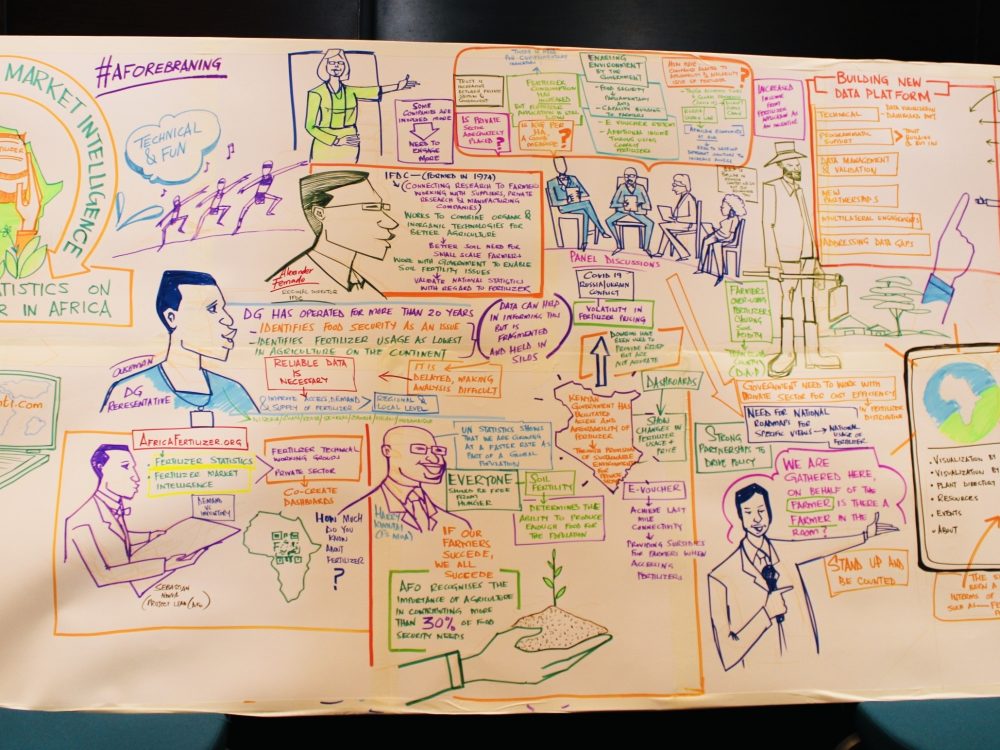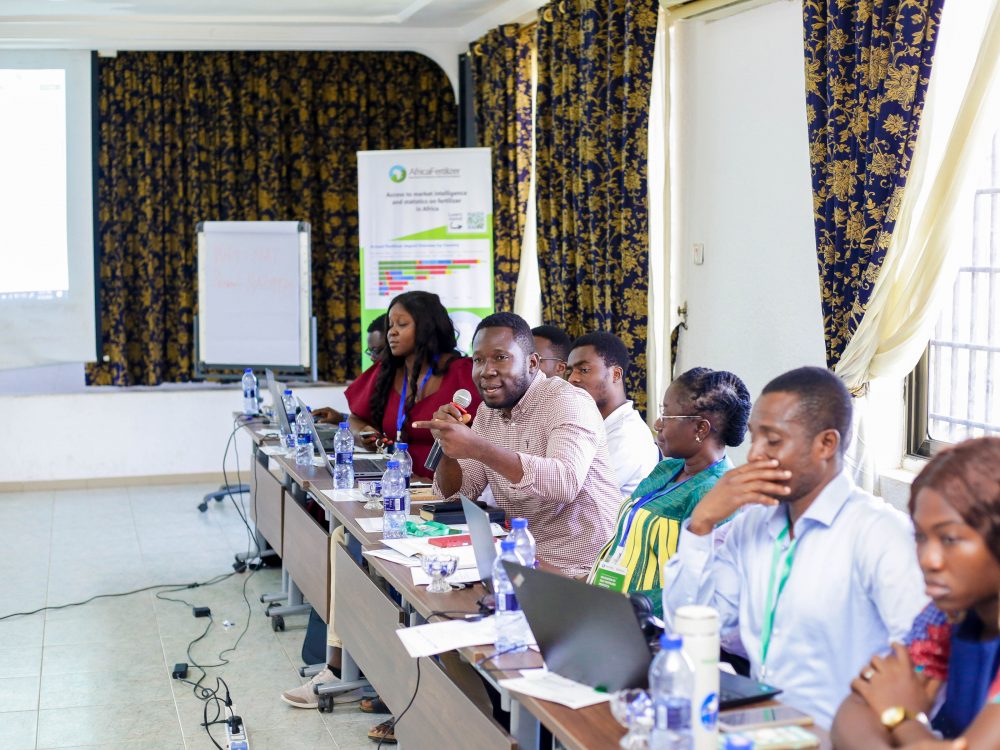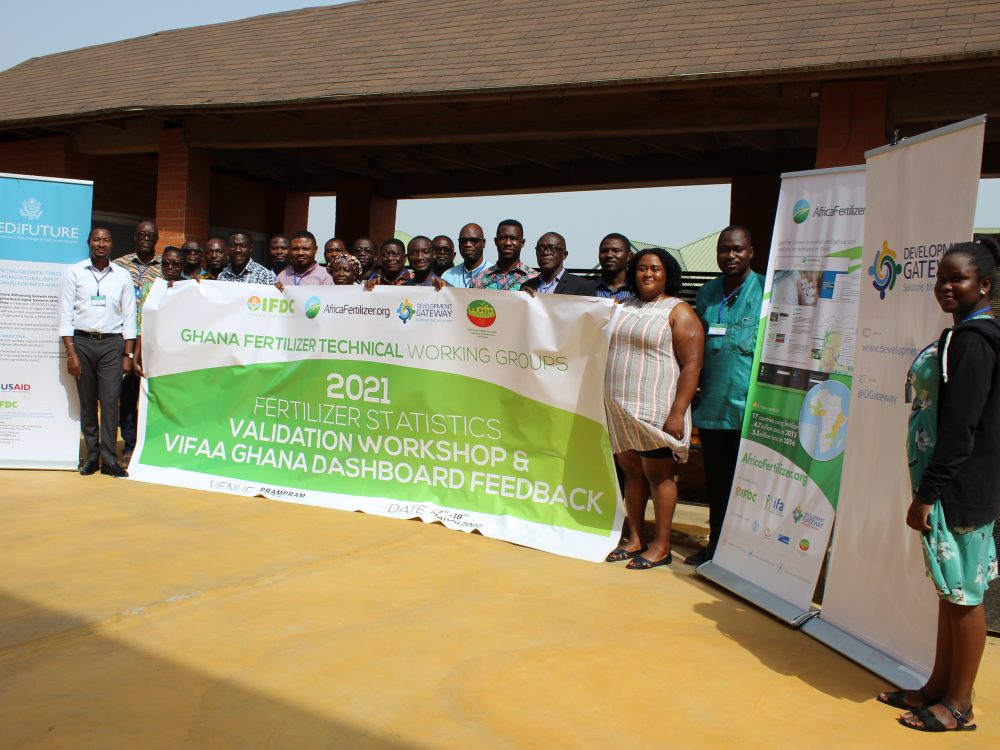Measuring COVID-19’s Impact on the Fertilizer Sector in Sub-Saharan Africa
In an effort to support food security, a new dashboard tracks country-specific mitigation measures, from economic responses to the availability of fertilizer stocks in 28 countries in sub-Saharan Africa. This is a joint press release from Development Gateway, AfricaFertilizer.org, International Fertilizer Development Center, The African Fertilizer and Agribusiness Partnership, and AFRIQOM.
Nairobi – Today, The COVID-19 Africa Fertilizer Watch Dashboard, covering 28 countries across sub-Saharan Africa was launched. This dashboard uses 11 indicators to track COVID-19 country-specific mitigation measures on the delivery and use of fertilizers to identify impacts on productivity and food security across the continent. The goal of this dashboard is to support development partners’ and the private sector’s efficient and effective responses to the evolving global health emergency, and ensure that sufficient quantities of appropriate fertilizers reach farmers in time for planting.
Sub-Saharan Africa (SSA) has the lowest fertilizer usage in the world – insufficient to replace soil nutrients lost every year to crop production. In addition, huge demographic shifts in SSA could have major impacts on food security. Combined with new COVID-19 lockdown policies, understanding where and how barriers to distribution are impacting farmers is crucial for agricultural productivity.
The dashboard was developed through a partnership between the International Fertilizer Development Center’s (IFDC) AfricaFertilizer.org initiative, the African Fertilizer and Agribusiness Partnership (AFAP), Development Gateway, and AFRIQOM.
The fertilizer sector has been lucky that most ships were in the seas when COVID-19 hit so product was already moving for this growing season in Africa. But as lockdowns and other impacts continue, we will need to monitor these indicators; countries likely won’t feel the full impact until the next growing season.
The Dashboard
The COVID-19 Africa Fertilizer Watch Dashboard is publicly available online. This dashboard uses 11 indicators such as price, availability, port operations, domestic transport, and government mitigation measures to track and visualize COVID-19’s impact on access and use of fertilizers across Africa. It also includes the impact of the COVID-19 pandemic on the population (overall and calculated trend over previous 14 days); the government/public measures taken (health and economy); and fertilizer-specific measures and/or logistical issues affecting movement of fertilizers from ports to farms (ports, roads, borders, retail, stocks and sector-wide responses).
Data on COVID-19 cases comes from https://covid-api.com/, an API based on public data from the Center for Systems Science and Engineering (CSSE) at Johns Hopkins University. The data repository is updated daily, and its full list of data sources are detailed there. The COVID-19 Africa Fertilizer Watch checks this system periodically for confirmed cases in each of the dashboard’s 28 supported countries, updating the “COVID-19 Trend” indicator as new data is available. More information about the methodology can be found on the COVID-19 Africa Fertilizer Watch website.
The Partnership
The project grew out of an existing partnership between AfricaFertilizer.org and Development Gateway, who have been working on the Visualizing Insights on Fertilizer for African Agriculture (VIFAA) program supported by the Bill & Melinda Gates Foundation. VIFAA is designed to holistically address the supply, demand, and use of fertilizer data at both country and regional levels through dashboards and visualization tools. As the COVID-19 pandemic evolved, VIFAA began building on the West Africa Fertilizer Watch and East & Southern Africa COVID-19 Fertilizer Watch bulletins developed by IFDC and supported by AFAP and AFRIQOM.
AfricaFertilizer.org (AFO) – the premier source for fertilizer statistics and information in Africa. It is hosted by IFDC and supported by several partners, key among them being the International Fertilizer Association (IFA), Argus Media, and Development Gateway via the VIFAA program. Since 2009, AFO has been collecting, processing, and publishing fertilizer production, trade, and consumption statistics for the main fertilizer markets in sub-Saharan Africa. AFO has an extensive network of fertilizer industry players in the main fertilizer trade corridors and maintains key information on the major producers, their production facilities and capacities, importers/suppliers, and various distribution channels.
The African Fertilizer and Agribusiness Partnership (AFAP) – is an independent non-profit organization founded in 2012 by a partnership of African development organizations. It was built on the work of the Comprehensive African Agriculture Development Program (CAADP), a framework for achieving ambitious agriculture development goals set in place by African nations and leaders. AFAP implements sustainable development projects and advises public, private sector clients, NGOs, and donors on policies and market-driven business solutions in the agriculture inputs and agribusiness value chain. AFAP is a technical partner on the COVID-19 Africa Fertilizer Watch, conducting impact assessments of the pandemic on the Agrodealer business.
Development Gateway: An IREX Venture (DG) – provides data and digital solutions for international development. DG creates tools that help institutions collect and analyze information; strengthen institutional capability to use data; and explore what processes are needed to enable evidence-based decisions. A mission-driven nonprofit since 2000 with staff based in five global hubs and around the world, DG supports the use of data, technology, and evidence to create more effective, open, and engaging institutions. DG developed the dashboard for the COVID-19 Africa Fertilizer Watch, and is the lead implementer of the four-year Visualizing Insights on Fertilizer for African Agriculture (VIFAA) program.
International Fertilizer Development Center (IFDC) – As an independent non-profit organization, IFDC works throughout Africa and Asia to increase soil fertility and develop inclusive market systems. Combining science-backed innovations, an enabling policy environment, holistic market systems development, and strategic partnerships, the organization bridges the gap between identifying and scaling sustainable agricultural solutions, resulting in improved household food security and enriched family livelihoods around the world. Using an inclusive approach, IFDC employs locally driven solutions that are environmentally sound and impact oriented that bring change at local, regional, and national levels. IFDC implements the USAID-funded Bureau for Resilience and Food Security Feed the Future project on Soil Fertility Technology Adoption, Policy Reform, and Knowledge Management (RFS-SFT). The project bridges the gap between scientific research and technology dissemination to smallholder farmers. RFS-SFT conducts research with partners from universities, national and international research and development institutions, and the private sector.
AFRIQOM – is an independent privately held firm that provides market research, analytics, trading intelligence and consultancy studies with a focus on African fertilizer markets. By doing so, and being the leaders in the continent, AFRIQOM brings transparency to an opaque market to help and contribute to Africa Green Revolution motion. AFRIQOM has recently launched AFRIQEVENTS program, in partnership with major associations, for conferences around the continent offering a novel platform to develop the fertilizer consumption rate in Africa.
VIFAA Going Forward
In November 2022, AfricaFertilizer (AFO), our partner on the Visualizing Insights on Fertilizer for African Agriculture (VIFAA) program, rebranded and launched a new website. This website includes the integration of country-specific VIFAA dashboards, which were previously housed in separate websites. By integrating the country-specific dashboards as well as fertilizer data on trade, production, consumption, and retail prices for 18 countries in sub-Saharan Africa, the new AFO data allows easier comparative analysis across countries and contributes its quota to the advancement of food security throughout Africa.
We have updated the previous country-specific dashboards links to now redirect you to AFO’s new website in order to ensure you are accessing the most up-to-date resources.
Share
Related Posts

From Data Gaps to Impact: Key Insights from the VIFAA Program
Over the last six years, DG, together with its partners AfricaFertilizer (AFO) and Wallace & Associates, collaborated to implement the Visualizing Insights on Fertilizer for African Agriculture (VIFAA) Program. In the program’s final year (2024), the team undertook a “program learning process” to reflect on outcomes, challenges, and successes through internal interviews. This blog captures five key learnings, which we hope will guide similar programs aiming to bridge data gaps in agricultural development.

Case Study: Fostering Sustainable Agriculture through Data-Driven Collaboration and Partnership: Ethiopia, Mozambique, and Nigeria
Through DG’s Visualizing Insights on Fertilizer for African Agriculture (VIFAA) program, we recently published a case study titled “Fostering Sustainable Agriculture through Data-Driven Collaboration and Partnership: Ethiopia, Mozambique, and Nigeria.” It dives deep into how the VIFAA program has impacted the fertilizer data and markets in Ethiopia, Mozambique, and Nigeria. In this blog, we explore the overall impact that the VIFAA program is making, why the program was needed, and offer some key highlights from the case study.

Fertilizer Technical Working Groups Provide Key Insights into Africa’s Fertilizer Sector
From June 2021 to September 2022, Development Gateway: An IREX Venture’s (DG’s) Visualizing Insights on Fertilizer for African Agriculture (VIFAA) program convened 12 Fertilizer Technical Working Groups in 14 countries which have yielded essential information on Africa’s fertilizer sector, including insights on how geopolitical events have impacted the fertilizer sector and what is needed to mitigate resulting threats to food security throughout Africa.
